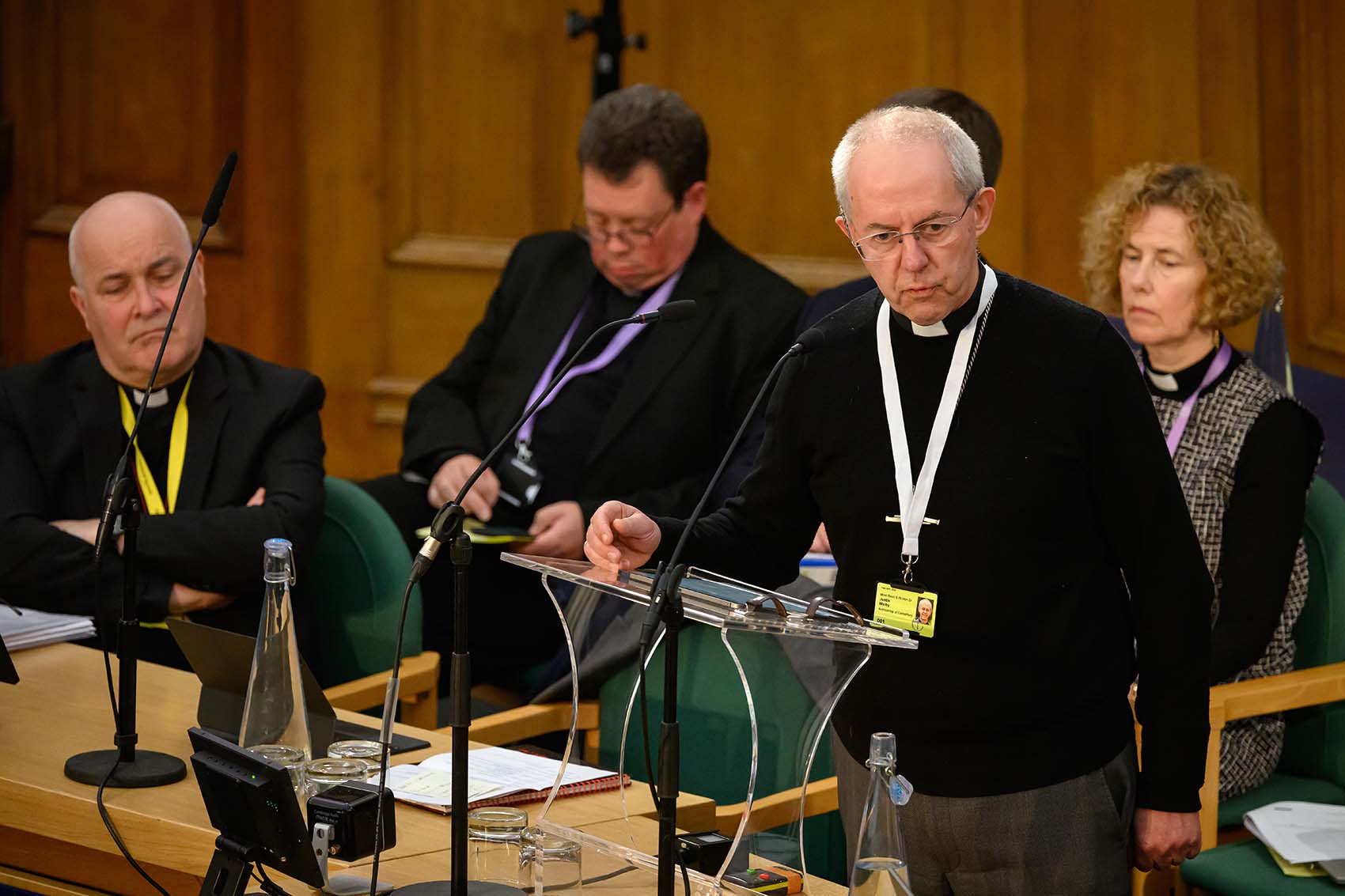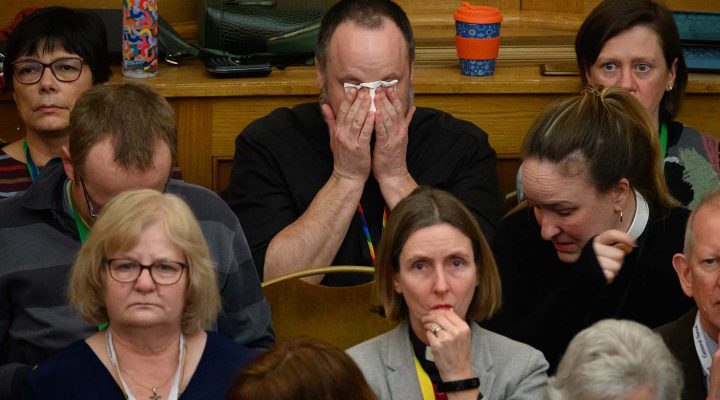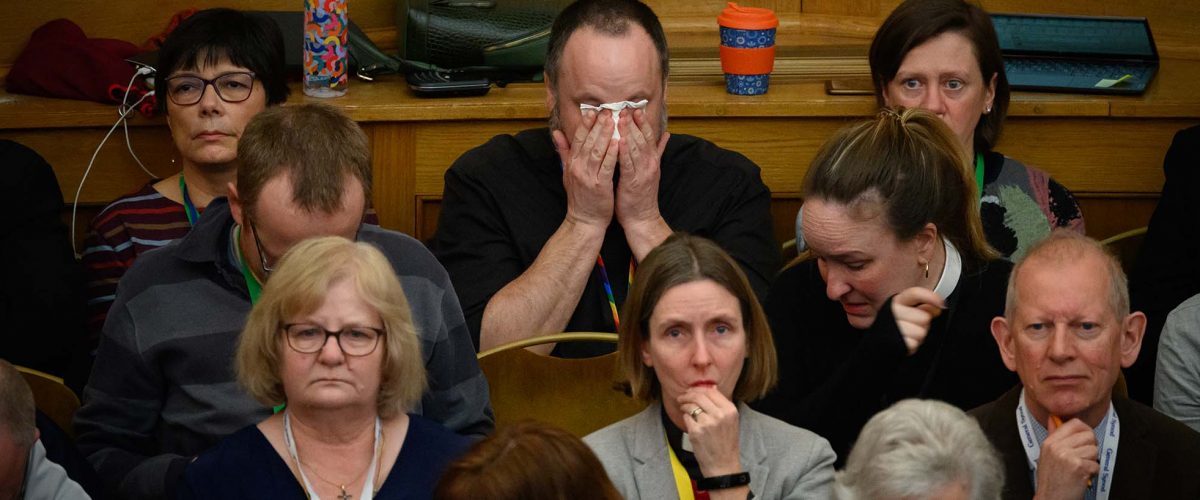The archbishop of Canterbury will not personally follow a new opportunity for Church of England clergy to “bless” same-sex unions, but the archbishop of York says he will.
This new option — not what either side in the controversy really wanted — was ratified by the Church of England’s General Synod last week. The attempt at compromise on the single most thorny issue in church life today had been advanced in January by the Council of Bishops.
Technically, the recommendation was approved by all three “houses” of the General Synod, by different margins in each house. According to the BBC, the House of Bishops voted 36 to four in favor, the House of Clergy voted 111 to 85 in favor, and the House of Laity voted 103 to 92 in favor.
While the new policy gained majority approval, it did not gain anything close to a supermajority approval except in the House of Bishops.
While the new policy gained majority approval, it did not gain anything close to a supermajority approval except in the House of Bishops — illustrating the contentious nature of the topic.
The action by the Church of England has worldwide implications because of the global nature of the Anglican “Communion,” which includes the Episcopal Church in America and several branches of the Anglican Church in America.
Actual language for the prayers of blessing has not been finalized yet but will be crafted by the bishops no later than July. At that time, the bishops will take up debate on a separate question — whether gay clergy must remain celibate.

Archbishop of Canterbury Justin Welby addresses delegates during the opening of the General Synod at The Church House on February 6, 2023, in London. (Photo by Leon Neal/Getty Images)
As if to highlight the diversity of views on the new policy of “blessing” same-sex unions while not allowing official marriages in the church, Justin Welby, archbishop of Canterbury, said he celebrates the change, but has a “responsibility for the whole communion” and therefore will not participate in such blessings.
The archbishop of Canterbury is the head of the Church of England and of the worldwide Anglican Communion.
In advance of last week’s General Synod, Welby told the BBC he would “continue to pray for all those who come seeking prayer and to pray with love,” including for those who are gay. “But because of my pastoral care and responsibility of being a focus of unity for the whole communion I will — while being extremely joyfully celebratory of these new resources — I will not personally use them in order to compromise that pastoral care.”
However, Stephen Cottrell, archbishop of York, said he would offer prayers of blessing for same-sex couples. The archbishop of York is considered second only to the archbishop of Canterbury.
“I’m really pleased it’s changing for my gay friends,” he said at a January news conference. “I think it puts the Church of England in a better place. … I completely support and understand Archbishop Justin’s position, but his position is different to mine.”
The new policy will not change the Church of England’s teaching that marriage is only between one man and one woman. More progressive forces in the church had advocated for a wholesale acceptance of same-sex marriage but failed in that quest. Same-sex couples still will not be allowed official marriage rites in the church.
Cottrell, archbishop of York, was among those who put a happy face on the middle-ground position last week.
“I’m really pleased that we now will be able to bless same-sex couples who are faithfully living in a civil marriage or a civil partnership, in church,” he told the BBC. “But at the same time, I’m glad that we believe there is a way forward to hold together in the church those who in good conscience will not be able to offer such services. It won’t be easy, but we are committed to it.”
Priests in the church will be allowed to opt in or opt out of the prayers blessing same-sex unions which could be given, for example, after a civil union is solemnized at a courthouse or other venue.
Among those not happy with the change is the Church of England Evangelical Council, which issued a statement saying it is “deeply saddened and profoundly grieved” by the change.
“The Church of England now appears set on a course of action that rejects our historic and biblical understanding of sex and marriage.”
“The Church of England now appears set on a course of action that rejects our historic and biblical understanding of sex and marriage,” a spokesman said. “This seems to us to be a lose-lose position for everyone in the Church of England. Those who wanted more change will continue to ask and push for greater change. Those of us who have been trying to uphold the historic and biblical understanding of marriage and singleness say change has gone too far.”
In January, the Church of England issued a formal apology for the times it had “rejected or excluded” LGBTQI people.
“For the times we have rejected or excluded you, and those you love, we are deeply sorry. The occasions on which you have received a hostile and homophobic response in our churches are shameful and for this we repent,” it said in a letter. “We have not loved you as God loves you, and that is profoundly wrong.”
How to respond to rising public acceptance of same-sex marriage has vexed most every major Protestant body in America — whether the denominations affirm such marriages or not. The Southern Baptist Convention, which staunchly opposes same-sex relations, still contends with the issue regularly. And the United Methodist Church is currently experiencing a split over this very issue.
Related articles:
Church of England won’t allow same-sex marriage but may allow a liturgical blessing of civil unions
The Church of England’s compromise on same-sex relationships is disastrous for everyone | Opinion by Page Brooks and David Bumgardner
Weekly churchgoers are now the primary holdouts against same-sex marriage


